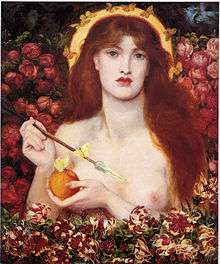Venus Verticordia

Venus Verticordia ("the changer of hearts") was an epithet of the Roman goddess Venus, alluding to the goddess' ability to change hearts from lust to chastity.
In the year 114 BC, three Vestal Virgins were condemned to death for transgressing with Roman knights the rigid law against sexual intercourse. To atone for their misdeeds, a shrine was dedicated to Venus Verticordia in the hope that she would turn the hearts of women and girls against licentiousness and towards chastity. Hence her name Verticordia, which means 'turner of hearts'. Under this title she was especially worshipped by married women, and on 1 April the Veneralia festival was celebrated in her honor.[1]
According to Valerius Maximus, a Roman woman named Sulpicia was chosen by the vote of ten drawn by lot from a pool of one hundred who had been chosen by the women of Rome as a body to dedicate a statue of Venus Verticordia. Sulpicia was deemed the chastest woman in Rome, and the method of selection was prescribed by the Sibylline Books.[2]
References
- ↑ Otto Kiefer (1934). Sexual Life in Ancient Rome. Translated by Gilbert and Helen Highet. Routledge. p. 125.
- ↑ L. Richardson, jr (1992). A New Topographical Dictionary of Ancient Rome. Johns Hopkins University Press. p. 411.